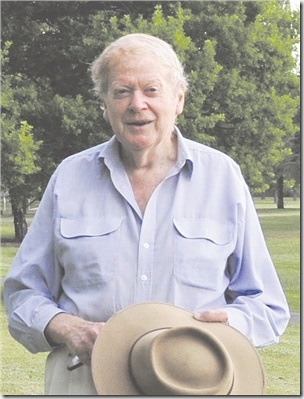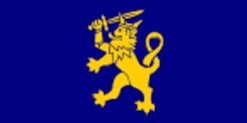Tales From New England, has been launched by Richard Torbay, Speaker of the NSW Legislative Assembly and Member for Northern Tablelands. Written by John Ryan, the book is a collection of essays that gives a New England context to aspects of the lives and works of several famous authors.
The book focuses on nine important writers, including Rolf Boldrewood (author of Robbery Under Arms) and D’Arcy Niland (author of The Shiralee), who have enriched their novels with imaginative re-creations of New England society and landscapes.
Associate Professor John Ryan (pictured here), the Armidale scholar and well-known regional and cultural historian, said the texts he discusses “tell us what we are in a way that history or the newspapers never do”. Dr Ryan stated that his aim in writing Tales From New England had been “to help readers appreciate the rich and accessible heritage content of these literary texts of the region, as they illustrate many aspects of our distinctive local identity”.
The other authors (and particular novels) given lively context in the book include Thomas Keneally (The Chant of Jimmy Blacksmith), Dymphna Cusack (Picnic Races), Gwen Kelly (in various reflective works), Geoff Page (Benton’s Conviction), David Crookes (The Light Horseman’s Daughter), Robert Barnard (Death of an Old Goat and Cry from the Dark), and Gabrielle Lord (Bones).
Dr Ryan said that the title of the book reflected the emphasis on “tradition – i.e., the passing on of stories” – in the explorations and publications of the Heritage Futures Research Centre.
The eight larger tales that Dr Ryan tells link the lives of the authors with the topics treated in the novels and their rich evocations of New England life and environment. There are dramatic stories, such as those encountered by Thomas Browne (Rolf Boldrewood) during his eight months in Armidale as Police Magistrate – including the attempted shooting and stabbing of the Roman Catholic Bishop of Armidale, Elzear Torregiani. And there are stories with a quieter rural and domestic focus, such as those connecting Dymphna Cusack’s New England nurture to her novel Picnic Races. These stories illuminate, in Dr Ryan’s words, those “timeless moments of quiet savouring of Australia’s colonial past and landscapes” that the text of Picnic Races contains.
Dr Ryan points out that these novels often give life and colour to historical events – for example the pursuit of the Governor brothers that inspired Thomas Keneally’s novel and the later film-based myth. “A number of the writers have created very effective historical vignettes,” he said, “such as Geoff Page’s local treatment of the 1916 conscription issue in Benton’s Conviction.
In the work of all the writers he discusses, he finds “a large measure of autobiography” and “much investigation of societal/educational processes as they affect individuals”. “The trials of education, as supplied at the primary, secondary, and – even more quirkishly – at the tertiary level, are explored both with some exasperation and also with a more profound investigation,” he says in his “Introduction”.
The 68 illustrations in Tales From New England include many rare photographs, as well as reproductions of original or early dust covers to remind readers of the books they knew they should read one day. Tales From New England provides a witty, wry and compassionate guide to such reading.













No comments:
Post a Comment